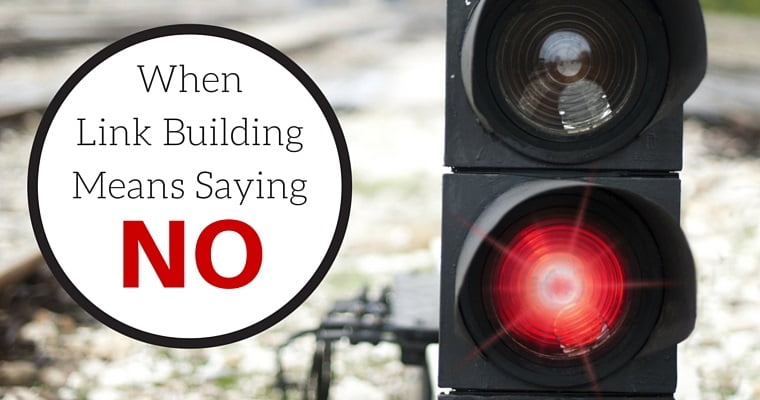

As a link builder, I sometimes feel like I’m biologically wired to get excited about links. I want to deliver the best quality links to my clients, and I want to build as many of those good links as I can. I get excited because it’s challenging. When I score an amazing link, I can’t help but feeling a little giddy, once I see the live link and record it to my reports.
Link building is at its best when the world revolves around the word “yes.”
“Yes, I would love to link to that page you emailed me. It’s a great fit for my website’s audience.”
“Yes, I am from the BBC, and I’d love to link to this amazing content of which you notified me.”
“Yes, you are meeting and/or surpassing my expectations as a client.”
“Yes, I am sending you a gift basket every month for the rest of your life, because you’ve built so many good links to my website.”
You get the point, right?
In the link building world, a “yes” makes our day. That means our outreach is on point, our strategies are sound, and our content is killer.
But once in a while, link building means saying “no”, and “yes” can be a four letter word.
Let me explain.
Saying No to a Link
Have you ever found money on the ground that didn’t belong to you?
Say you found $100 in the Target parking lot. It’s been a long day, and traffic has been terrible. The lines inside the store were long, and you don’t remember table lamps being that expensive the last time you bought one. It’s just been a rotten day, and then you see $100 just sitting there– it could be yours, no questions asked.
It’s easy to say “yes” in that situation. It’s easy money.
But is it the right decision?
Someone else lost that money. You could go turn it into the customer service desk, even though the original owner might never be reunited with it. Still, it’s probably the right thing to do, considering it’s definitely not yours.
What’s my point?
Sometimes saying no to an easy link opportunity is hard, because it’s right there, and it’s ripe for the taking. It’s easy, but it might not be the right thing to do.
I’ve become so accustomed to saying yes to links (and money, to be honest, but only if I’ve earned it. No parking lot money for me), that saying “no” doesn’t come naturally.
Still, just as that gnawing pang of guilt might outweigh 3 free fill-ups at the gas station or the cost of a decent pair of shoes, sometimes the bad of a link outweighs the good of a link, when you really think about it.

Links to which I’d probably say no:
- Links from a “Bad Neighborhood” Site – Relevant links are the best type of links, and sometimes those links come from websites with low Domain Authority, which is completely fine. But if those links come from websites that are irrelevant, or websites that are just lacking a consistent theme or overall purpose (other than linking out to other websites) , even if getting the link is easy as pie, I’d take a pass.
- Not a “Good Fit” – Some links just aren’t a good fit, even if they come from authority websites that get tons of traffic. If, for example, I can score a link from The New York Times or an .edu website, but it makes no sense within the context of the page, I’d say no. Users don’t like being misled, and amassing high-profile, irrelevant links isn’t a good habit.
- Manipulative Links – I’m not talking about black hat stuff here or even really grey hat stuff, I mean links that totally manipulate naive webmasters, disguised links, or really any link where both parties aren’t fully aware of what’s taking place. I think links are the most natural thing on the web, but if I have to pull the wool over some webmaster’s eyes, no matter how easy it is, I’ll say no. Once they realize what happened, it’ll look really bad, and it’s links like that, which often give link building a bad name. It’s just not cool.
- Links I Didn’t Ask For – If you put together a great piece of content, there’s no better feeling in the world than the one you get when the shares and links start rolling in. But all of those links aren’t created equal. Usually those links come from people who are excited about what you created, which is a testament to how good a job you’re doing. But sometimes, they come from irrelevant sites, spam sites, or bizarre sites on which no human being has ever laid eyes. That’s when I have to say a retroactive “no” and either ask for the link to be removed, ask for a no-follow, or fire up the disavow tool.
If you run a small business, think about these hypothetical links before you set out to build links of your own. You’re probably short on time and easy links sound great, but they don’t always work out that way. There are someeasy links that are completely safe, but they’re not any of the links mentioned above.
Saying No to Your Boss
I understand not every link builder is their own boss and has someone to answer to, so I wanted to briefly touch on a couple of other scenarios.
If you’re an in-house link builder, you probably report to your company’s marketing manager or CEO. Sometimes, they don’t understand link building, and the only metric that makes those dollar signs flash in their eyes is sheer volume of links. Trust me, I feel you.
If your boss wants you to pursue those types of links I mentioned above, because they don’t understand the possible damage or impact they might doto your company’s website, I urge you to respectfully say “no.”
Similarly, if you work for an agency, your manager might be breathing down your neck to get a certain number of links, and sometimes it’s unrealistic and comes down to a disconnect between your salespeople, your managers, your clients, and you.
The salespeople are focused on closing the deal and have no problem setting unrealistic expectations.
Your manager is focused on keeping the client happy and trying to live up to those expectations.
And you, the link builder, are caught in between and expected to keep everyone happy.
If the pressure is coming down on you to deliver something you don’t feel is possible, you need to say something. Either the client has unrealistic expectations because of the sales process, or your account managers are promising anything to get or keep a client.
That won’t make anyone happy in the end, and someone has to say something about it. It might as well be you.
Explaining “No”
In the link building world, if you’re going to say “no,” you have to explain yourself.
If the webmaster of a linking site, your boss, your salespeople, or your client doesn’t really understand what link building involves, the burden is on you to explain it to them.
Explain the value in what you do, the process, and time it takes to build a quality link. Explain why thoughtful, relevant links are much more valuable than a random barrage of links from every corner of the web. You know link building; they don’t. You need to speak up.
It’s up to you to explain your job and why you’re good at it, in plain English. If those “no” links become a “yes” due to excessive pressure from above,everyone’s going to lose. It’s just a matter of time.
The best links are built with deep thought and integrity. I know from experience. I’ve seen the result of bad links, and although they may yield some quick results, they usually cause damage in the long run.
At the End of the Day, Link Building Should be All About “Yes”
Yes, this strategy is working.
Yes, people are responding to our outreach.
Yes, we’re building amazing links.
Inevitably, though, you’ll have to say “no” to a link, a boss, or even a client. It’s never easy, but it makes every following “yes” that much sweeter.
[“source-searchenginejournal”]
